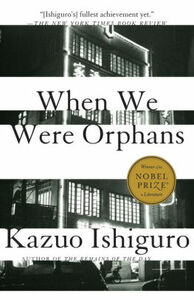Take a photo of a barcode or cover
adventurous
challenging
dark
emotional
mysterious
sad
medium-paced
Plot or Character Driven:
A mix
Strong character development:
Yes
Loveable characters:
Yes
Diverse cast of characters:
Yes
Flaws of characters a main focus:
Yes
This book really surprised me. Whilst there are elements that were incredulous and downright frustrating to follow; the settings in London and Shanghai in the early 1930's are constructed so vividly, and the British colonisation of China and the flood of opium into China from British companies is deeply unsettling.
Ishiguro explores the limitations of the lens of nostalgia through which one approaches the vaguely remembered past. As we follow Cristopher's journey and determination to find his parents, we can't help but question his grip on reality as he allows his vivid memories of his past colour even his more immediate experiences. Despite his renown as one of Britain's most decorated detectives, I found myself wanting to flip back and check I hadn't missed the evidence to justify his incredulous conclusions or confirm her was perhaps actually delusional.
And whilst on paper, these inconsistencies, and Ishiguro's effort to keep reader's at arms length from the details of Christopher's many solved crimes or the rationale behind them, and the rather heavy handed emphasis on the mismatch between his and others' view of the world should have annoyed me - I can't explain quite why - I was really invested in the journey.
Ishiguro explores the limitations of the lens of nostalgia through which one approaches the vaguely remembered past. As we follow Cristopher's journey and determination to find his parents, we can't help but question his grip on reality as he allows his vivid memories of his past colour even his more immediate experiences. Despite his renown as one of Britain's most decorated detectives, I found myself wanting to flip back and check I hadn't missed the evidence to justify his incredulous conclusions or confirm her was perhaps actually delusional.
And whilst on paper, these inconsistencies, and Ishiguro's effort to keep reader's at arms length from the details of Christopher's many solved crimes or the rationale behind them, and the rather heavy handed emphasis on the mismatch between his and others' view of the world should have annoyed me - I can't explain quite why - I was really invested in the journey.
Am upgrading this book by a star, in accordance with opinions revised and improved since having read the book and written my comment below. See review of A Pale View of Hills for reasons.
medium-paced
dark
reflective
sad
slow-paced
Plot or Character Driven:
A mix
Strong character development:
Complicated
Loveable characters:
No
Diverse cast of characters:
Yes
Flaws of characters a main focus:
Complicated
Not as compelling as the other Ishiguro I’ve read.
Moderate: Racism, War
mysterious
reflective
slow-paced
Plot or Character Driven:
Character
Strong character development:
Yes
Loveable characters:
Yes
Diverse cast of characters:
Yes
Flaws of characters a main focus:
Yes
Kazuo Ishiguro’s When We Were Orphans exemplifies his distinctive narrative approach, marked by the use of an unreliable first-person narrator whose perception of reality is fundamentally skewed by memory’s imperfections. The protagonist, Christopher Banks, bears resemblance to characters such as Masuji (An Artist of the Floating World) and Ruth (Never Let Me Go), whose recollections similarly reflect subjective, fragmented, and often contradictory versions of the past. Ishiguro’s mastery in employing this narrative trope shapes the novel’s psychological depth and complexity.
At its surface, the novel can be categorized as a detective story: Christopher, a renowned private investigator, returns to 1937 Shanghai to solve the longstanding mystery of his parents’ disappearance during his childhood. Yet the narrative quickly subverts conventional detective tropes through Christopher’s unreliable account and distorted self-perception. His inability to reconcile others’ memories of him with his own highlights his deep psychological dissonance, illuminating how trauma has reshaped not only his recollections but also his engagement with reality.
The historical backdrop of Shanghai in turmoil—caught between the Japanese invasion and the Chinese civil war—functions as both a literal and metaphorical landscape. The novel’s climactic, hallucinatory journey through war-ravaged slums artfully merges the surreal physical destruction with Christopher’s mental fragmentation. Ishiguro’s portrayal of this liminal space between reality and illusion offers a profound exploration of trauma, memory, and denial.
Although the novel unfolds at a measured pace, it sustains strong narrative engagement through sustained psychological tension and meticulous character study. Themes of responsibility, compliance, and guilt emerge gradually, embedded within Christopher’s quest but ultimately transcending the detective plot. While some narrative elements—particularly the fate of Christopher’s mother—may feel contrived to some readers, these serve to underscore the novel’s broader meditation on the burdens of memory and the complex interplay between personal and historical trauma.
When We Were Orphans is a nuanced fusion of detective fiction and psychological drama, ultimately revealing a man trapped between childhood fantasy and the harsh realities of adulthood against the backdrop of a world on the cusp of global conflict. Ishiguro’s subtle, restrained storytelling remains compelling and evocative, reinforcing his reputation as a masterful chronicler of memory’s ambiguities and human fragility.
mysterious
medium-paced
Plot or Character Driven:
Plot
Strong character development:
No
Loveable characters:
Yes
Diverse cast of characters:
No
Flaws of characters a main focus:
No
adventurous
mysterious
fast-paced
Plot or Character Driven:
Plot
Strong character development:
No
Loveable characters:
No
Diverse cast of characters:
Yes
Flaws of characters a main focus:
No
mysterious
tense
medium-paced
Plot or Character Driven:
Character
challenging
dark
mysterious
sad
slow-paced
Plot or Character Driven:
A mix
Strong character development:
Complicated
Loveable characters:
Complicated
Diverse cast of characters:
N/A
Flaws of characters a main focus:
Yes
Graphic: War, Injury/Injury detail
Moderate: Kidnapping, Abandonment
Minor: Physical abuse, Torture




